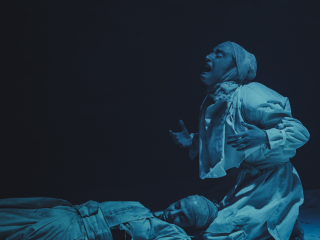Newsflash: it is no longer enough to simply be able to act. It is even insufficient to ‘merely’ be a triple threat. Suddenly many theatrical projects are requesting or requiring actors to be proficient in a wide variety of additional skills. Today we’re going to� examine the history of shows that require multidisciplinary actors, why these type of shows are having a moment right now, and how you, the working actor, can make yourself the most marketable for these kinds of productions.
First, a little history: the need for multidisciplinary actors goes all the way back to the birth of theater. In ancient Athens, the proverbial Greek Chorus was required to sing in unison as well as emote, the original convergence of song and storytelling. Traditional opera, operetta, and vaudeville all employed performers with skills in multiple areas. In the 20th century, the birth of the modern musical (exemplified in classic shows like Oklahoma!) created a need for performing artists who could act, sing, and dance in equal measure.�
But in the modern age, as these types of new shows have multiplied and diversified, the skill sets required of actors has likewise expanded. So what changed?�
The sudden influx of multidisciplinary actor shows can largely be traced back to one person: the British director John Doyle. Doyle’s Broadway revivals of Sweeney Todd and Company, in which the actors also doubled as the orchestra, set a new style-standard of performance. His less-is-more, meta-theatrical, DIY style became in vogue on Broadway, and trickled in to many regional theaters around the country. Other recent influential shows that required interdisciplinary actors include the Broadway musical Once (employing actor / musicians), director Diane Paulus’ 2013 Broadway revival of Pippin (employing actor / circus performers), and the play War Horse (employing actor / puppeteers).�
So why this sudden influx? A simple (though incomplete) answer is that it saves money; it costs the producers much less to hire one performer who does many things, instead of many performers who each specialize in one thing only. But I believe the rise of multidisciplinary actor shows has less to do with finances and more to do with style. I think this trend is a direct counter response to more traditional, large-scale spectacles that have previously been in vogue in the American Theater, especially American Musical Theater. Instead of producing another big and brassy, razzle-dazzle extravaganza, theater creators have recently gravitated towards smaller, actor-driven and actor-focused works, plays and musicals that are overtly and unabashedly theatrical. By highlighting the multiple skills of the actors, the productions are drawing attention to the act of artistic creation itself, allowing the audience to marvel at the many things a performer can do to tell a story.�
Which brings us to the question: how do you, the actor, become a true multidisciplinary performer? Friends, it’s time to put the “multi” in multi-hyphenate. Take a class. Learn an instrument. Take that obscure hobby from your childhood and get it back up to speed. Make yourself as well rounded as you can. Special skills are not just jokes at the bottom of your resume; they can get you jobs. Diversify your talents.�
You never know what unique talents casting directors might be looking for. Double down on what you are already good at, then expand your horizons. Don’t limit your classes to voice and dance. Find something special that you like, research it, and dive in. The more things you know how to do, the more employable you become. Because in the contemporary moment, multidisciplinary is the new normal. It’s time to get creative!�














